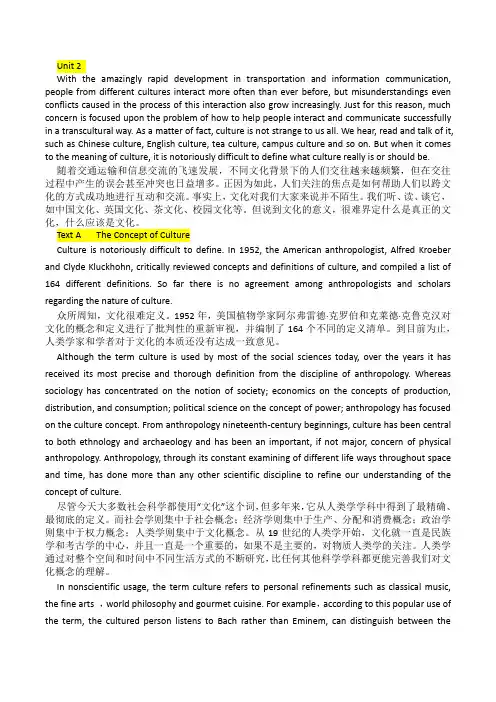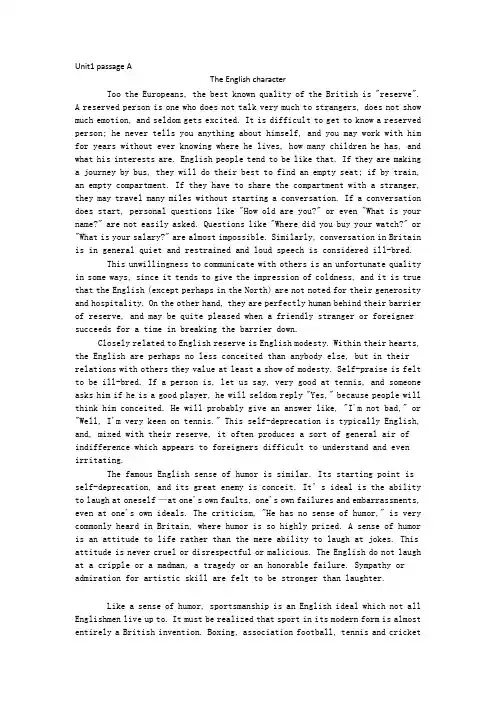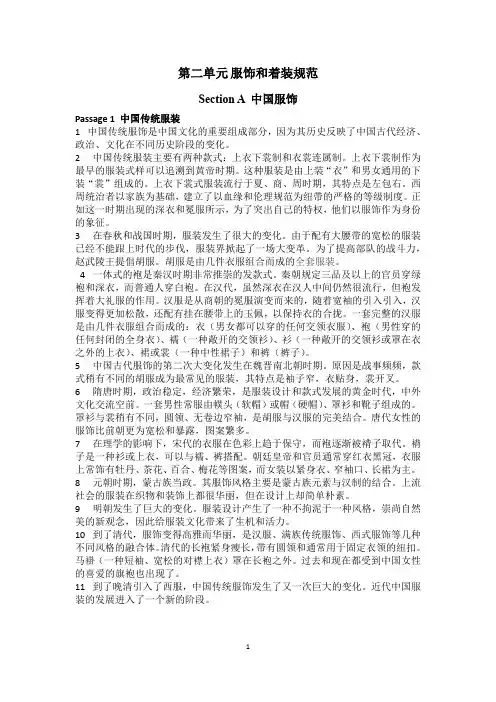大学生跨文化交际U2Pa课文翻译定稿2014
跨文化交际-unit1-6-课后translation中英对照

跨文化交际-unit1-6-课后translation中英对照Unit 1 Page 22The growth of intercultural communication as a field of study is based on a view of hi story that clearly demonstrates people and cultures have been troubled by a persistent i nability to understand and get along with groups and societies removed by space, ideol ogy, appearance, and behavior from their own. What is intriguing about many of huma n civilization's failure is that they appear to be personal as well as global. The story of h umankind is punctuated with instances of face-to-face conflicts as well as international misunderstanding--major and minor quarrels that range from simple name-calling to i solationism or even armed conflict.It is obvious that increased contact with other cultures and subcultures makes it impe rative for us to make a concerted effort to get along with and to try to understand peop le whose beliefs and backgrounds may be vastly different from our own. The ability, thr ough increased awareness and understanding, to peacefully coexist with people who do not necessarily share our lifestyles or values could benefit us not only in our own neigh borhoods but could be the decisive factor in maintaining world peace.纵观历史,我们可以清楚地看到,人们由于彼此所处地域、意识形态、容貌服饰和行为举止上存在的差异,而长久无法互相理解、无法和睦相处。
跨文化交际李成明unit2-A原文+翻译DOCX

Unit 2With the amazingly rapid development in transportation and information communication, people from different cultures interact more often than ever before, but misunderstandings even conflicts caused in the process of this interaction also grow increasingly. Just for this reason, much concern is focused upon the problem of how to help people interact and communicate successfully in a transcultural way. As a matter of fact, culture is not strange to us all. We hear, read and talk of it, such as Chinese culture, English culture, tea culture, campus culture and so on. But when it comes to the meaning of culture, it is notoriously difficult to define what culture really is or should be.随着交通运输和信息交流的飞速发展,不同文化背景下的人们交往越来越频繁,但在交往过程中产生的误会甚至冲突也日益增多。
正因为如此,人们关注的焦点是如何帮助人们以跨文化的方式成功地进行互动和交流。
事实上,文化对我们大家来说并不陌生。
我们听、读、谈它,如中国文化、英国文化、茶文化、校园文化等。
大学英语4 U2课文翻译

听了一个有趣的故事会发笑。
很开心,古今中外都一样。
这一现象同语言本身一样悠久。
那么,到底是什么东西会使一个故事或笑话让人感到滑稽可笑呢?我是第一次辨识出幽默便喜欢上的人,因为我因此我曾试图跟学生议论和探讨幽默。
这些学生文化差异很大,有来自拉丁美洲的,也有来自中国的。
我还认真思考过一些滑稽有趣的故事。
这么做完全处于自己的喜好。
为什么听完我讲完一个笑话后,班上有些同学会笑的前仰后合,而其他学生看上去就像刚听我读了天气预报一样呢?显然,有些人对幽默比别人更敏感。
而且,我们也发现有的人很善于讲笑话,而有的人小说一点有趣的事却要费好大的劲。
我们都听人说过这样的话:“我喜欢笑话,但我讲的不好,也总是记不住。
”有些人比别人更有音乐、数学之类的才能一样。
一个真正风趣的人在任何场合都有笑话可讲,而且讲了一个笑话,就会从他记忆里引出一连串的笑话。
一个缺乏幽默的人不可能成为一群人中最受欢迎的。
一个真正有幽默的人不仅受人喜爱,而且在任何聚会上也往往是人们注意的焦点,这么说是有道理的。
甚至有些动物也有幽默感。
我岳母从前经常来我们家,并能住上很长的一段时间。
通常她不喜欢狗,但却很喜欢布利茨恩——我们杨过的一条不拉多母犬,而且,她们的这种好感是相互的。
布利茨恩在很小的时候就常常戏弄外祖母,当外祖母坐在起居室里她最喜欢的那张舒适的椅子上时,布利茨恩就故意把她卧室里的一只拖鞋叼到起居室,并在外祖母刚好够不到的地方蹦来跳去,一直逗得外祖母忍不住站起来去拿那只拖鞋。
外祖母从椅子上一起老,布利茨恩就迅速跳上那椅子,从它那闪亮的棕色眼睛里掠过一丝拉布拉多试的微笑,无疑是在说:“啊哈,你又上了我的当。
”典型的笑话或幽默故事有明显的三部分构成。
第一部分是铺垫(即背景),接下来是主干部分(即故事情节),随后是妙语(即一个出人意料或令人惊讶的结尾)。
如果这个妙语含有一定的幽默成分,这个笑话便会更有趣。
通常笑话都包含这三部分,而且每部分都必须交代清楚。
大学英语跨文化交际教程翻译 杨晓萍 陶岳炼 主编

Unit1 passage AThe English characterToo the Europeans, the best known quality of the British is "reserve".A reserved person is one who does not talk very much to strangers, does not show much emotion, and seldom gets excited. It is difficult to get to know a reserved person; he never tells you anything about himself, and you may work with him for years without ever knowing where he lives, how many children he has, and what his interests are. English people tend to be like that. If they are making a journey by bus, they will do their best to find an empty seat; if by train, an empty compartment. If they have to share the compartment with a stranger, they may travel many miles without starting a conversation. If a conversation does start, personal questions like "How old are you?" or even "What is your name?" are not easily asked. Questions like "Where did you buy your watch?" or "What is your salary?" are almost impossible. Similarly, conversation in Britain is in general quiet and restrained and loud speech is considered ill-bred.This unwillingness to communicate with others is an unfortunate quality in some ways, since it tends to give the impression of coldness, and it is true that the English (except perhaps in the North) are not noted for their generosity and hospitality. On the other hand, they are perfectly human behind their barrier of reserve, and may be quite pleased when a friendly stranger or foreigner succeeds for a time in breaking the barrier down.Closely related to English reserve is English modesty. Within their hearts, the English are perhaps no less conceited than anybody else, but in their relations with others they value at least a show of modesty. Self-praise is felt to be ill-bred. If a person is, let us say, very good at tennis, and someone asks him if he is a good player, he will seldom reply "Yes," because people will think him conceited. He will probably give an answer like, "I'm not bad," or "Well, I'm very keen on tennis." This self-deprecation is typically English, and, mixed with their reserve, it often produces a sort of general air of indifference which appears to foreigners difficult to understand and even irritating.The famous English sense of humor is similar. Its starting point is self-deprecation, and its great enemy is conceit. It’s ideal is the ability to laugh at oneself —at one's own faults, one's own failures and embarrassments, even at one's own ideals. The criticism, "He has no sense of humor," is very commonly heard in Britain, where humor is so highly prized. A sense of humor is an attitude to life rather than the mere ability to laugh at jokes. This attitude is never cruel or disrespectful or malicious. The English do not laugh at a cripple or a madman, a tragedy or an honorable failure. Sympathy or admiration for artistic skill are felt to be stronger than laughter.Like a sense of humor, sportsmanship is an English ideal which not all Englishmen live up to. It must be realized that sport in its modern form is almost entirely a British invention. Boxing, association football, tennis and cricketwere all first organized and given rules in Britain. Rules are the essence of sport, and sportsmanship is the ability to practise a sport in obedience to its rules, while also showing generosity to one's opponent and good temper in defeat. Moreover, sportsmanship as an ideal is applied to life in general. One of the most elementary rules of life is "never hit a man when he's down"─in other words, never take advantage of another person's misfortune. English school-boys often show this sense of sportsmanship to a surprisingly high degree in their relations with each other.译文:对于其他欧洲人来说,英国人最著名的特点是“谨慎”。
跨文化交际中英文化对比课文参考译文U2

第二单元服饰和着装规范Section A 中国服饰Passage 1 中国传统服装1中国传统服饰是中国文化的重要组成部分,因为其历史反映了中国古代经济、政治、文化在不同历史阶段的变化。
2中国传统服装主要有两种款式:上衣下裳制和衣裳连属制。
上衣下裳制作为最早的服装式样可以追溯到黄帝时期。
这种服装是由上装“衣”和男女通用的下装“裳”组成的。
上衣下裳式服装流行于夏、商、周时期,其特点是左包右。
西周统治者以家族为基础,建立了以血缘和伦理规范为纽带的严格的等级制度。
正如这一时期出现的深衣和冕服所示,为了突出自己的特权,他们以服饰作为身份的象征。
3在春秋和战国时期,服装发生了很大的变化。
由于配有大腰带的宽松的服装已经不能跟上时代的步伐,服装界掀起了一场大变革。
为了提高部队的战斗力,赵武陵王提倡胡服。
胡服是由几件衣服组合而成的全套服装。
4一体式的袍是秦汉时期非常推崇的发款式。
秦朝规定三品及以上的官员穿绿袍和深衣,而普通人穿白袍。
在汉代,虽然深衣在汉人中间仍然很流行,但袍发挥着大礼服的作用。
汉服是从商朝的冕服演变而来的,随着宽袖的引入引入,汉服变得更加松散,还配有挂在腰带上的玉佩,以保持衣的合拢。
一套完整的汉服是由几件衣服组合而成的:衣(男女都可以穿的任何交领衣服)、袍(男性穿的任何封闭的全身衣)、襦(一种敞开的交领衫)、衫(一种敞开的交领衫或罩在衣之外的上衣)、裙或裳(一种中性裙子)和裤(裤子)。
5中国古代服饰的第二次大变化发生在魏晋南北朝时期。
原因是战事频频,款式稍有不同的胡服成为最常见的服装,其特点是袖子窄,衣贴身,裳开叉。
6隋唐时期,政治稳定,经济繁荣,是服装设计和款式发展的黄金时代,中外文化交流空前。
一套男性常服由幞头(软帽)或帽(硬帽)、罩衫和靴子组成的。
罩衫与裳稍有不同,圆领、无卷边窄袖,是胡服与汉服的完美结合。
唐代女性的服饰比前朝更为宽松和暴露,图案繁多。
7在理学的影响下,宋代的衣服在色彩上趋于保守,而袍逐渐被褙子取代。
大学英语跨文化交际教程翻译 杨晓萍 陶岳炼 主编

Unit1 passage AThe English characterToo the Europeans, the best known quality of the British is "reserve".A reserved person is one who does not talk very much to strangers, does not show much emotion, and seldom gets excited. It is difficult to get to know a reserved person; he never tells you anything about himself, and you may work with him for years without ever knowing where he lives, how many children he has, and what his interests are. English people tend to be like that. If they are making a journey by bus, they will do their best to find an empty seat; if by train, an empty compartment. If they have to share the compartment with a stranger, they may travel many miles without starting a conversation. If a conversation does start, personal questions like "How old are you?" or even "What is your name?" are not easily asked. Questions like "Where did you buy your watch?" or "What is your salary?" are almost impossible. Similarly, conversation in Britain is in general quiet and restrained and loud speech is considered ill-bred.This unwillingness to communicate with others is an unfortunate quality in some ways, since it tends to give the impression of coldness, and it is true that the English (except perhaps in the North) are not noted for their generosity and hospitality. On the other hand, they are perfectly human behind their barrier of reserve, and may be quite pleased when a friendly stranger or foreigner succeeds for a time in breaking the barrier down.Closely related to English reserve is English modesty. Within their hearts, the English are perhaps no less conceited than anybody else, but in their relations with others they value at least a show of modesty. Self-praise is felt to be ill-bred. If a person is, let us say, very good at tennis, and someone asks him if he is a good player, he will seldom reply "Yes," because people will think him conceited. He will probably give an answer like, "I'm not bad," or "Well, I'm very keen on tennis." This self-deprecation is typically English, and, mixed with their reserve, it often produces a sort of general air of indifference which appears to foreigners difficult to understand and even irritating.The famous English sense of humor is similar. Its starting point is self-deprecation, and its great enemy is conceit. It’s ideal is the ability to laugh at oneself —at one's own faults, one's own failures and embarrassments, even at one's own ideals. The criticism, "He has no sense of humor," is very commonly heard in Britain, where humor is so highly prized. A sense of humor is an attitude to life rather than the mere ability to laugh at jokes. This attitude is never cruel or disrespectful or malicious. The English do not laugh at a cripple or a madman, a tragedy or an honorable failure. Sympathy or admiration for artistic skill are felt to be stronger than laughter.Like a sense of humor, sportsmanship is an English ideal which not all Englishmen live up to. It must be realized that sport in its modern form is almost entirely a British invention. Boxing, association football, tennis and cricketwere all first organized and given rules in Britain. Rules are the essence of sport, and sportsmanship is the ability to practise a sport in obedience to its rules, while also showing generosity to one's opponent and good temper in defeat. Moreover, sportsmanship as an ideal is applied to life in general. One of the most elementary rules of life is "never hit a man when he's down"─in other words, never take advantage of another person's misfortune. English school-boys often show this sense of sportsmanship to a surprisingly high degree in their relations with each other.译文:对于其他欧洲人来说,英国人最著名的特点是“谨慎”。
跨文化交际_Unit_2_参考翻译
跨文化交际_Unit_2_参考翻译Unit Two Task 11)A smooth sea never made a skillful mariner. 平静的大海决不能造就出熟练的水手。
/花盆里生长不出参天大树。
/温室里长不出栋梁之才。
2)He who would search for pearls must dive below.不入虎穴,焉得虎子。
/ 欲寻珍珠就要潜到水里。
/ 欲寻珍珠欲潜入水。
3)Living without an aim is like sailing without a compass. 生活没有目标如同航行没有罗盘。
/没有目标的生活如同没有罗盘的航行。
4)To have another fish to fry另有要事/ 另有事情得做5)The water that bears the boat is the same that swallows it up.水能载舟,亦能覆舟。
(The same knife cuts bread and fingers.)6)前人栽树,后人乘凉。
One sows and another reaps. / One man sows and another reaps. / One generation plants the trees in whose shade another generation rests. / The precedence planted, the later generations enjoy its cool.7)斩草不除根,逢春又发青。
If the grass is only cut, then the next spring it will revive. / Cut weeds and dig up the roots.8)种田不用问,深耕多上粪。
Planting has no better measures but ploughing deeply and fertilizing much more.9)生米煮成熟饭。
跨文化交际英语阅读教程unit02课后翻译
Checking Is Believing参考译文:验证为实网络随时在拓展,它几乎可以给大多数学科提供无限量的信息。
除了提供大量信息之外,网络使用起来也方便快捷。
如今,我们拥有很多设备它们可以联网并展示信息,即使当你在赶路时也是如此。
因此,网络可以提供一个获取信息的方便途径,而且网络已经受到了学生们的极力推崇。
如果一位学生有条件上网,那么他/她就没有必要去图书馆查找资料。
这样不仅节省了大量的时间也省去了交通费。
几乎可以这样说,学生们比上班族有更多的时间浏览网页,网络上提供的信息有助于他们完成学习任务,这一点成了他们上网的额外动机。
Reading BThis freedom is, of course, in sharp contrast to traditional media. Publishing companies, for example, can be very selective about their authors. Such companies have high standards and will only publish a book if the author is well qualified and experienced in the subject area. Publishers get other experts to review a book before it is printed and further improvements to the book are made by editors and book designers employed by the publishing companies. Editors frequently make suggestions to make the book longer or shorter and to improvethe au thor’s use of language to make the writing clearer and more easily comprehensible to readers. Designers handle the layout of a book, including the cover, photographs and other graphics and even the font type and style of the text.参考译文:网络提供的这种自由和传统的媒介相比当然有着明显的区别。
跨文化交际课文翻译
关于跨文化交流,跨文化市场才是第一的真正的首要的范本。
考虑到古罗马帝国的市民,他们是第一个诞生商店的地球文明。
商人们通过在商店的上面树立旗帜来展示他们商品货物的图片来解决跨文化市场的困扰。
这种做法不仅能为罗马帝国中未受过教育的市民服务还能帮助罗马商人们获得被他们用武力征服的殖民地的商业信息。
回顾过去,我们会发现两千多年前的亚里士多德曾明确说过:“有效劝服基本的信念仍可以把他应用到今天的买卖商品上然而在古代的雅典可能会引起一场大的争论”。
很明显的可以看出,交流是现代市场的根基。
毋庸置疑,全球化市场的时代已经到来。
每年超过4万件的商品货物进入国际市场,其中超过一半是来自美国。
这里面85%的商品都不合格。
通往国际化市场成功的道路是建立在失败的市场垃圾碎片和广泛的广告活动之上的。
他们中的大多数之所以会失败,是因为跨文化交流被曲解了。
在跨文化市场里,如果你想把低劣的语言举止降低到最小,那么就不假定任何事情。
几乎我们都听说过关于美国通用汽车公司,他们尽力想把他们的雪佛兰牌汽车销往拉美国家。
但是雪佛兰在说西班牙语的拉美国家按字面意思是不能行走。
当公司发现汽车买不出去的原因时,他们就把车重新命名,然后销往这些国家。
福特汽车公司,美国又一个汽车界的领头羊,也有类似的问题。
他们的pinto 牌汽车在当地也没有达到预期的销售,原因时他们的汽车其意思在当地为男性生殖器。
最终福特公司把所有的名牌汽车重新命名为corcel,其意思为骏马。
伊莱克斯,一个日用电器制造者,其在英国获得了很大的成功。
不幸的是,他们的广告招牌的意思在美国和英国大不相同。
在美国,suck的意思是多虱子的。
英国的牙膏生产商在法国制造出来了一种牙膏叫cue。
它被人们所耻笑。
因为它的名字使人想起了臭名昭著的色情杂志——Cue。
但是市场中的文化意识更多于细心的翻译。
每一文化都有其微妙之处,当然也有其鲜明的禁忌。
尽管大多数的人不能列出他们自己文化的规则,但是他们很明白什么时候这些禁忌被触碰了。
大学英语跨文化交际教程翻译 杨晓萍 陶岳炼 主编
Unit1 passage AThe English characterToo the Europeans, the best known quality of the British is "reserve".A reserved person is one who does not talk very much to strangers, does not show much emotion, and seldom gets excited. It is difficult to get to know a reserved person; he never tells you anything about himself, and you may work with him for years without ever knowing where he lives, how many children he has, and what his interests are. English people tend to be like that. If they are making a journey by bus, they will do their best to find an empty seat; if by train, an empty compartment. If they have to share the compartment with a stranger, they may travel many miles without starting a conversation. If a conversation does start, personal questions like "How old are you?" or even "What is your name?" are not easily asked. Questions like "Where did you buy your watch?" or "What is your salary?" are almost impossible. Similarly, conversation in Britain is in general quiet and restrained and loud speech is considered ill-bred.This unwillingness to communicate with others is an unfortunate quality in some ways, since it tends to give the impression of coldness, and it is true that the English (except perhaps in the North) are not noted for their generosity and hospitality. On the other hand, they are perfectly human behind their barrier of reserve, and may be quite pleased when a friendly stranger or foreigner succeeds for a time in breaking the barrier down.Closely related to English reserve is English modesty. Within their hearts, the English are perhaps no less conceited than anybody else, but in their relations with others they value at least a show of modesty. Self-praise is felt to be ill-bred. If a person is, let us say, very good at tennis, and someone asks him if he is a good player, he will seldom reply "Yes," because people will think him conceited. He will probably give an answer like, "I'm not bad," or "Well, I'm very keen on tennis." This self-deprecation is typically English, and, mixed with their reserve, it often produces a sort of general air of indifference which appears to foreigners difficult to understand and even irritating.The famous English sense of humor is similar. Its starting point is self-deprecation, and its great enemy is conceit. It’s ideal is the ability to laugh at oneself —at one's own faults, one's own failures and embarrassments, even at one's own ideals. The criticism, "He has no sense of humor," is very commonly heard in Britain, where humor is so highly prized. A sense of humor is an attitude to life rather than the mere ability to laugh at jokes. This attitude is never cruel or disrespectful or malicious. The English do not laugh at a cripple or a madman, a tragedy or an honorable failure. Sympathy or admiration for artistic skill are felt to be stronger than laughter.Like a sense of humor, sportsmanship is an English ideal which not all Englishmen live up to. It must be realized that sport in its modern form is almost entirely a British invention. Boxing, association football, tennis and cricketwere all first organized and given rules in Britain. Rules are the essence of sport, and sportsmanship is the ability to practise a sport in obedience to its rules, while also showing generosity to one's opponent and good temper in defeat. Moreover, sportsmanship as an ideal is applied to life in general. One of the most elementary rules of life is "never hit a man when he's down"─in other words, never take advantage of another person's misfortune. English school-boys often show this sense of sportsmanship to a surprisingly high degree in their relations with each other.译文:对于其他欧洲人来说,英国人最著名的特点是“谨慎”。
- 1、下载文档前请自行甄别文档内容的完整性,平台不提供额外的编辑、内容补充、找答案等附加服务。
- 2、"仅部分预览"的文档,不可在线预览部分如存在完整性等问题,可反馈申请退款(可完整预览的文档不适用该条件!)。
- 3、如文档侵犯您的权益,请联系客服反馈,我们会尽快为您处理(人工客服工作时间:9:00-18:30)。
Unit 2 Passage A
1. 中国的核心价值与儒家思想有关,儒家思想的道德准则是对人际关系中道德品质的总结,孔子就用它来夫妇有别,长幼有序,朋友有信。
”在两千多年的封建统治时期,统治阶级用这五伦来处理每件事,这就形成了一个分级的社会,即臣忠于君,子孝于亲的社会。
2. 在英国文艺复兴时期,人们开始强调人的尊严以及现实生活的重要性。
他们提倡人不仅有享受美好生活的权利,更要具备完善自己和创造奇迹的能力。
这就是人文主义的基本理念。
自那以后,人们开始尊重人性,随即有发展出了我们今日称之为“自由”的思想,即民主。
3. 以美国为例,优秀的个人价值观就是独立、努力以及生活成功、个人成就与乐于助人三方面实现平衡。
就社会价值观而言,美国人在这6方面领先:言论自由、个人自由、个人权利、公开争论、独立思考和。
而中国的价值观则提倡努力工作、尊重学习、诚实守信、独立自由和持久忍耐。
亚洲人值得推崇的6个社会价值观是社会有序、和谐一致、政府问责、开拓思路、言论自由和尊重权威。
4. 与美国人不同的是,东亚人通常更尊重权威,赞誉社会有序,可与他们一致的是亚洲人也尊重新观念,政府问责及言论自由。
5. 中西方文化的不同与个人主义和集体主体文化密不可分。
6. 个人主义就是人们注重个体、强调个体需要。
一般来说,西方文化倾向于个人主义。
7. 集体主义文化即把自身当作是集体(家庭、单位、部落、国家)的一员,一般认为集体的需要高于个体。
大多数亚洲文化,包括中国在内,倾向于集体主义。
8.个人主义是指在一个社会里个人权利是首要的。
大多数西方人士认为每个人都有自己独立的身份和人格,这应该得到认可并强化。
因此,如果不理解个人主义,则无法理解西方的文化和西方人。
唯有理解了个人主义,我们才能明白西方人对家庭、友谊和隐私的看法。
个人主义的核心是追求个人利益和成就,作为一项社会的基本品质,它被高度地重视,并被人们真心铭记和认真领会。
9. 在基督教的传统文化中,个人主义不但对彼此重要,而且对社会对上帝都重要。
个人主义从他们的祖先那里传承下来,因而对西方人而言,个人主义不是自私而是正直。
他们如此重视个人主义,以至于他们认为如果有人不去实践个人主义,那就是错的行为。
“自助者天助”,从这句谚语我们可以看出西方人对个人主义的态度。
可是对中国人来说,个人主义是贬义词,是利己主义,它就意味着自私的人品和散漫的纪律。
10.传统的中国信条,尤其是儒家思想,欣赏集体主义。
它强调群体合作,强调个体的成功归功于单位、组织或社团全体成员的共同努力。
中国人认为为了集体而牺牲个人利益是非常高尚的品质,继而谦逊待人、善解人意的品质也受到高度赞扬。
11. 让我们从这两个事例来看文化的基本差异:学校
学校的组织形式可以看出集体主义和个人主义文化的差异。
例,中国的中学、甚至大学,学生通常群体组合,他们被编成班,所有同班同学学习同一课程。
相反,美国高中和大学的学生都是个体的组合,他们通常根据自己的兴趣至少选择几门课程,因此他们经常到不同的班级上不同的课,也没有类似中国的“班”
12. 另一个集体主义和个人主义区别的例子就是宴会。
比如,在中国,宴会通常是大家围坐在一起享受美食或观赏节目,有的观看,有的会亲自参与节目。
相反,美国典型的宴会就是鸡尾酒会。
在晚会中大家成双成对,或三五成群一起聊天,间或走动走动,换换聊天对象。
13.下面是西方个人主义文化和集体主义文化更具体的区别。
14. 西方人常认为个人得自力更生,并且希望别人亦如此。
比如,西方人在紧要关头尽管会为家人和朋友提供帮助,但并不认为这是他们的义务。
他们认为这样的帮助必须出于自
愿。
而在秉承集体主义的文化中,人们认为从团队中(家庭班级等)获得帮助是理所当然的,并且认为同伴为之提供帮助是应尽的义务。
15. 西方人通常认为个人利益不能无条件服从于集体利益,至少个人得有权决定自己是否该为了集体利益牺牲自身权益。
比如,大部分西方人认为个人隐私权至关重要,政府不可以持有私人具体信息,即使这些信息更有益于解决犯罪问题,造福社会。
实际上西方人认为保障群体利益的最好方法就是保障个人的权利。
而在集体主义文化中,人们更易于接受个人利益服从集体利益的观点。
16. 西方人认为事事得自己拿主意,并且每个人要能担当。
不管双方关系有多密切,他们不会为团体中他人所做的事承担责任。
例如,一个西方人犯罪了,他的家人朋友不会因此觉得自己得为此担当责任,同样,家人功成名就了,西方人也不会指望从中获利。
而在集体主义文化中,人们会觉得自己是集体中的一员,必须为其他成员承担起更多的责任。
17. 最后的差别就是不同文化,人们对“个人主义”的看法的不同。
西方人认为坚持“个人主义”是件好事。
在英语中,“个人主义”并不是个贬义词,甚至带点褒义色彩。
而在中国,“个人主义”常常带有贬义,有时甚至就是“自私”的同义词。
18. 总结前,个人主义文化和集体主义文化的差别,有两点是我们必须记住的。
19. 1. 我们说西方文化是个人主义文化,并不意味着所有的西方人都是个人主义者。
我们只能说,比起集体主义文化中的人,西方人更倾向于按个人主义的原则来行事思考。
个人主义文化和集体主义文化的区别是相对的,而不是绝对的。
20. 2. 不是所有的西方国家都一律秉承个人主义的。
相对来说,一些西方国家确实更信仰个人主义。
比如英格兰和美国,通常人们认为他们比北欧国家更具个人主义精神。
同样,在东亚国家中,尽管每个国家都多多少少倾向于集体主义,他们的集体主义程度在很多方面还是有区别的。
但一般来说,西方文化要比中国和其他一些亚洲国家要更个人主义一些。
中西方文化的很多方方面面体现出了两种主义的差别。
